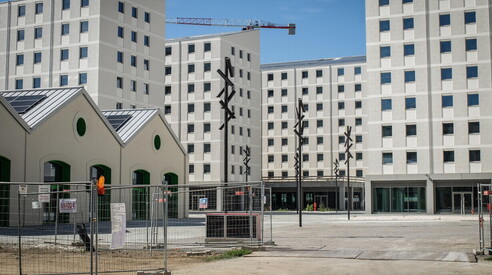Meloni and Salvini return to talk about the Housing Plan, without saying how they intend to implement it.


ANSA photo
numbers to decipher
The prime minister and the head of the Ministry of Transport relaunch the government's work on affordable housing, but again they don't provide details, especially regarding the funding needed: according to the CPI Observatory, at least €12.5 billion is needed (almost as much as the Strait of Messina Bridge).
On the same topic:
Nearly a month after the Rimini Meeting , Prime Minister Giorgia Meloni returned to the topic of housing. "We have allocated €670 million to the state guarantee fund for first-time home buyers, and we are working on a housing plan for young couples, to provide affordable housing ," she said yesterday during her speech at Fenix , the national youth festival. The topic was also taken up by Deputy Prime Minister Matteo Salvini, who, from the stage at his 33rd Pontida meeting , said he intends to request a contribution of several billion from major Italian banks: "Whoever can, should lend a hand, for example, by helping me raise the necessary funds for a housing plan."
Despite the enthusiasm with which it was presented by the two leaders, we know very little about this initiative so far. The Ministry of Infrastructure, led by Salvini himself, provided a few more details on June 17th following a technical meeting with institutions and trade associations. The "Piano Casa Italia" was presented as a strategic program aimed at addressing housing hardship across the country and reorganizing existing housing options. The plan would therefore target individuals and families with low-to-medium incomes who struggle to afford free market prices and who do not qualify for social housing . The MIT slides discuss "promoting innovative models for financing social housing projects, based on the integration of public and private resources," but also "creating flexible housing solutions, based on a combination of residential and social housing, and integrated into the city." These key objectives are ambitious, yet still poorly defined.
For their part, entrepreneurs have outlined more specific paths. Confindustria's Plan for Sustainable Housing for Workers , presented in January, follows the same path as the Italian Housing Plan, which the confederation sees as "an initial framework for the implementation" of their proposals. It aims to remove urban planning and administrative obstacles that hinder the construction and redevelopment of new buildings, as well as introduce guarantee instruments to encourage investments by construction companies and real estate funds, with the ultimate goal of facilitating the matching of labor supply and demand, thus eliminating the housing problem.
Even on the funding front, there is still little clarity. The Ministry of Transport document currently allocates €100 million for 2027 and 2028, along with another €560 million earmarked for distribution through 2030, as provided for in the latest budget law . The total is €660 million, to be increased in the future through public-private partnerships and the creation of a "Housing Fund," with resources for the Regions and long-term loans from national and European credit institutions.
As it stands, the financial coverage appears rather limited. The CPI Observatory, established within the Catholic University of the Sacred Heart in Milan, has estimated a cost of approximately €12.5 billion for the construction of 50,000 homes. Exactly €1 billion less than the investment required to finance the Strait of Messina Bridge . This is an initial estimate, albeit a rough one, but it gives a good idea of the potential impact a real housing plan could have on state coffers. These are considerations the government will have to keep in mind when drafting the budget, especially after the rating agency Fitch's promotion, which it earned precisely after keeping public finances in order.
Faced with the program's ambition, Salvini revived the idea of drawing on the balance sheets of credit institutions. "I think we'll ask for a contribution from the major banks, which have made more than €500 million in profits on interest and commissions that they charge you," he speculated at yesterday's League party, following several "nips at the banks" from Minister of Economy Giancarlo Giorgetti. The latest was on Saturday, at the Open Festival: " Those who work in the banking system imagine what contribution they can make . Given how much they earn, they have no reason to be worried." Certainly, if the banks' contribution is equal to that raised by the (non-)tax on banking "excess profits" introduced last year— just over €300 million —putting a cap on the government's Housing Plan could prove even more complex.
More on these topics:
ilmanifesto





